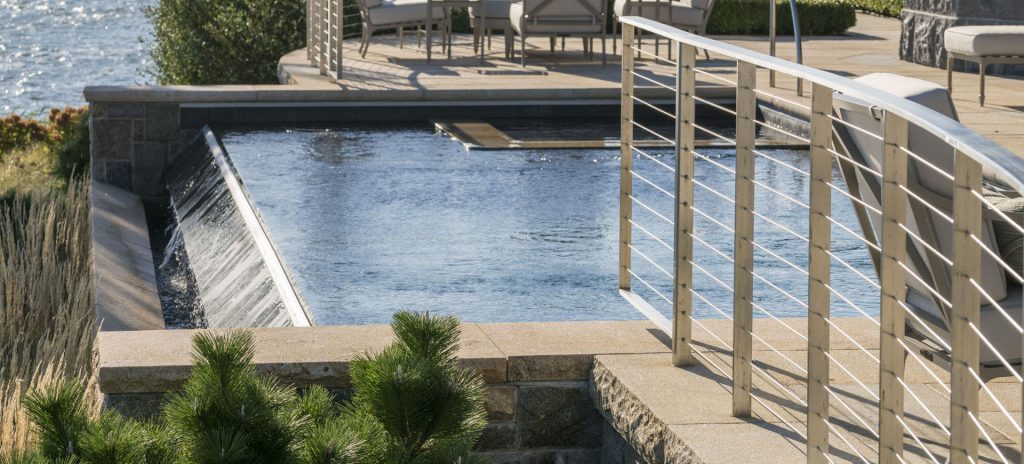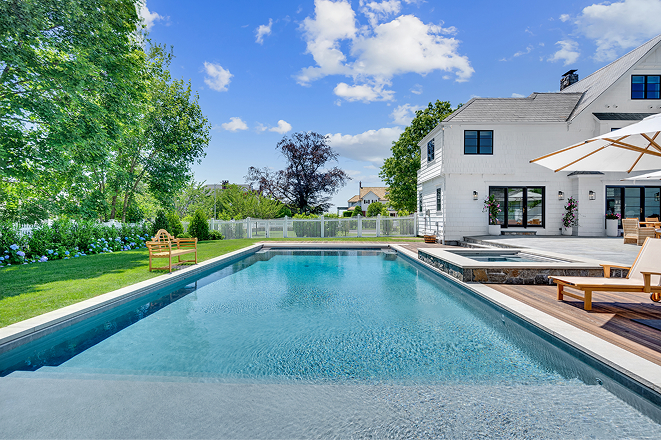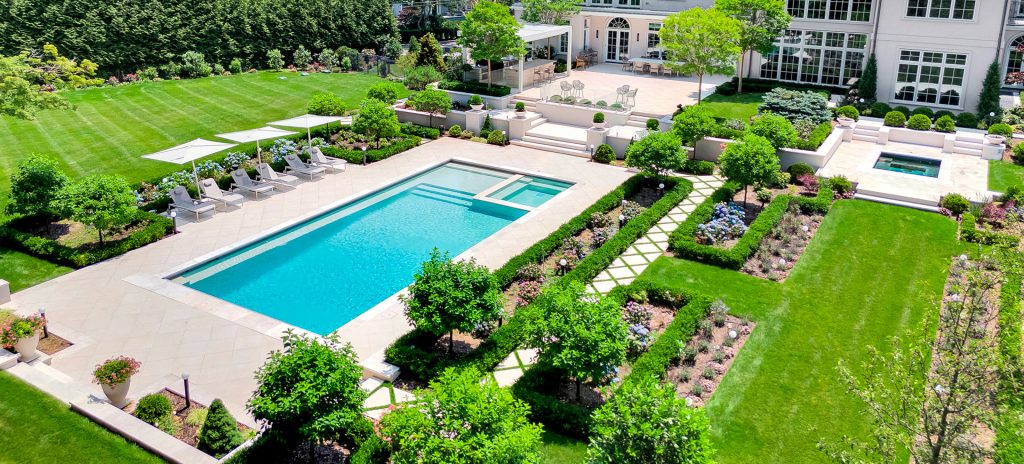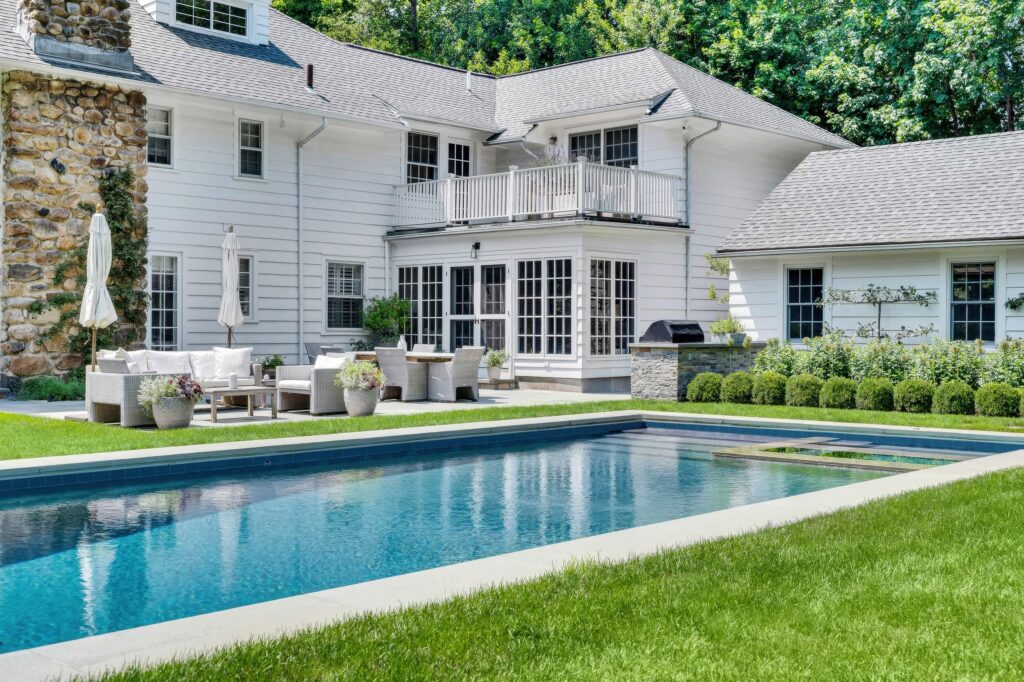Its a familiar scenario for many NY luxury pool owners: you want to go for a swim, but the water’s freezing. You need warmth, but it also needs to feel quiet and effortless. That singing machinery shouldn’t break your serenity, either. That’s why gas pool heating is the most efficient and quiet solution for homeowners in Westchester and Rockland counties, and the rest of the greater NYC suburbs.
For many homeowners, gas pool heating NY and natural gas pool heaters strike the perfect balance of comfort, speed, and tranquility. With the right setup and noise reduction techniques, a gas-first system molds your pool into a personal retreat. All it takes is one simple goal: fast warmth, gentle sound, and a luxurious backyard atmosphere.
Quick Answer: The Best Way to Warm Your NY Pool Quietly
The quietest, coziest way to heat a New York pool is with a gas pool heating system supported by thoughtful design. Gas heaters deliver quick warmth even in cold weather, while acoustic pads, enclosures, and a quiet equipment yard keep sound levels below 55 decibels. These silent pool heating systems NY homeowners love turn everyday pools into private spa experiences.
Why Homeowners Value Comfort and Quiet in Luxury Pools
A truly comfortable pool stays calm and warm simultaneously. The steady noise of mechanical equipment can disrupt relaxation and make even a high-end pool feel industrial.
According to the U.S. Centers for Disease Control and Prevention (CDC), the Model Aquatic Health Code advises keeping mechanical noise below 55 decibels in aquatic environments. That’s about the level of a soft conversation. The code also recommends using materials with a sound absorption coefficient of 0.20 or greater to limit echo.
By creating a quiet equipment yard and separating machinery from recreation areas, homeowners maintain a luxury setting’s peaceful tone. Isolation pads, acoustic fencing, and smart placement make the pool heating systems NY homeowners rely on cozy and nearly undetectable.
Why Gas Pool Heating in NY Outperforms Other Options
New York’s unpredictable seasons make gas pool heating NY the most reliable option for year-round comfort. While heat pumps work efficiently in warm air, they don’t work as well in temperatures below 50°F. Natural gas pool heaters in New York maintain steady output even during late fall or early spring chills.
If you’re planning your seasonal opening, you can also explore our guide on when to start swimming by Memorial Day in NY to make sure your pool is perfectly timed for warmer weather.
A 2020 study by Li and Zhang in Building Simulation found that gas-fired boilers offer rapid, reliable, and quiet heating compared to electric systems. They reach desired temperatures faster, ideal for spas or spontaneous evening swims.
Because combustion occurs inside a sealed chamber, modern gas heaters produce low operational noise, often between 50 and 65 decibels. When installed in a quiet equipment yard, that sound can drop below 55 decibels.
The Cozy Advantage: Instant Warmth for Every Season
Coziness is about timing as well as temperature. Gas heaters provide high thermal output almost immediately spreading that warm blanket feeling.
Many luxury pools include spa-priority circuits that heat shallow or lounge areas first, while the main pool follows. Smart automation adds another layer of convenience. Homeowners can use an app to activate heating before arriving home, guaranteeing the water’s warm and ready on demand.
Noise Control That Turns Your Backyard into a Sanctuary
To achieve true quiet luxury, it’s worth learning from mechanical engineers. The National Institute of Standards and Technology (NIST) published a Practical Guide to Noise Control detailing methods to isolate and silence machinery. Its principles apply directly to pool equipment.
NIST found that rubber or neoprene isolation pads under motors can reduce vibration noise by up to 8 decibels when blower speeds are lowered by 25%. Concrete pads lined with resilient materials block low-frequency hums from transferring through decks.
The same guide recommends enclosing noisy components within sound-lined barriers. Fiberglass-lined panels, for example, can reduce noise by 2–3 decibels per foot of duct length. A quiet equipment yard that combines isolation, distance, and absorption can achieve 15–20 decibels of total reduction. That’s enough to make natural gas pool heaters in New York almost silent.
Balancing Fast Heat with Energy Efficiency
While speed defines gas heating, efficiency now shares the stage. Modern systems integrate hybrid elements and automation to conserve energy without sacrificing comfort.
Combining the two creates an ideal solution. A hybrid setup uses gas for that initial burst of heat, then uses solar or electric help to keep the temperature steady. There’s less total gas runtime, longer equipment life, and minimal operational sounds.
Gas vs. Heat Pumps: Which Is Better for Your NY Pool?
| Aspect | Gas Heaters | Heat Pumps | Best Use Case in NY |
| Noise | 50–65 dB; <55 with isolation and enclosures | 38–55 dB; whisper-quiet | Gas-first for year-round use |
| Heating Speed | Heats in minutes | Slower in cold air | Ideal for spas and quick recovery |
| Efficiency | 84–96% thermal (CEC 2022) | COP up to 4.5 (Li & Zhang, 2020) | Hybrid = fast + efficient |
| Installation Needs | CO detectors, sealed vents (CDC 2023) | Requires airflow and clearance | Gas-first in a quiet equipment yard |
How to Design a Quiet Equipment Yard for Your Pool
A quiet equipment yard is a design strategy. Proper siting and sound mitigation ensure your heating system blends into the background.
According to the CDC’s Model Aquatic Health Code, indoor gas-fired heaters need to be in ventilated rooms equipped with carbon monoxide detectors. Applying this logic outdoors means keeping your natural gas pool heater in New York well-vented and away from entertainment areas.
Here’s how to plan your setup:
- Distance: Keep the heater at least 10–15 feet from lounge spaces.
- Direction: Face exhaust vents away from patios and windows.
- Surface: Mount on a level concrete pad with rubber or neoprene isolators.
- Barriers: Add low masonry walls or wooden screens lined with acoustic material.
Together, these details maintain that relaxing aura while keeping the system safe and code-compliant.
Simple Upgrades That Make Gas Pool Heaters Even Quieter
Every pool has its own voice. The following upgrades help fine-tune your quiet equipment yard for the lowest possible sound output:
- Isolation Pads: Cushion vibrations and stop bass frequencies from echoing through decking.
- Flexible Pipe Couplings: Prevent mechanical stress and rattle.
- Acoustic Insulation: Install foam or fiberglass panels in enclosures for up to 10 dB reduction.
- Low-RPM Settings: Decreasing fan speed by 25% can cut sound by roughly 8 dB (NIST).
- Routine Maintenance: Clean filters and balanced fans ensure quieter operation over time.
These small improvements can turn a noisy corner of your yard into a totally silent space.
Hybrid Pool Heating Systems for Quiet, Efficient Comfort
You don’t have to sacrifice efficiency for luxury. Many homeowners combine their gas pool heating NY systems with solar or automated controls.
Li and Zhang’s 2020 study found that hybrid pool systems can cut total energy use by up to 30%, especially when paired with high-quality covers. Thin, 0.05 cm PVC or polyethylene pool covers can prevent 50–70% of heat loss overnight.
Smart automation enhances this effect. Systems track temperature and wind speed, turning the heater on only when needed. This also protects your pool heater from damage. The result is a smooth, quiet, and energy-efficient experience that feels refined and effortless.
Safety Tips Every Homeowner Should Know About Gas Pool Heating
The same systems that make pools cozy also need safety guardrails. The CDC requires that any combustion-based heater—whether indoor or outdoor—include UL 2075–certified carbon monoxide detectors. These devices provide early warnings and help maintain air quality in enclosed spaces.
Proper ventilation also prevents excess moisture and resonance, both of which can amplify sound. Following these standards verifies compliance with New York’s mechanical codes but also long-term comfort and safety.
Scheduling routine inspections, especially before each swim season, keeps your silent pool heating systems NY efficient, quiet, and secure.
Key Takeaways for NY Homeowners Seeking Silent Warmth
- Gas pool heating NY systems offer unmatched speed, reliability, and comfort.
- Natural gas pool heaters in New York deliver rapid warmth even in cold weather.
- A quiet equipment yard ensures sound levels stay below 55 dBA, meeting CDC acoustic standards.
- Hybrid systems and smart automation keep your silent pool heating system efficient and calm.
- Proper siting and maintenance preserve safety and peace year-round.
Create a Peaceful, Warm, and Efficient Backyard Retreat
A warm pool should invite you in, not distract you with background noise. Gas-first heating gives New York homeowners the quick, consistent comfort they want. At the same time, thoughtful engineering creates a space defined by calm and quiet.
According to the CDC, maintaining low noise and proper safety systems ensures both physical and acoustic comfort. NIST confirms that vibration isolation and lined barriers can make natural gas pool heaters in New York whisper-quiet. Studies by Li and Zhang and the California Energy Commission show that hybrid setups amplify efficiency without losing warmth.
When you combine gas pool heating NY technology with a quiet equipment yard and silent pool heating systems, you get the best of both worlds—a pool that feels like a private resort and sounds like pure tranquility.
Resources
Centers for Disease Control – Model Aquatic Health Code
Li, Yantong & Nord, Natasa & Huang, Gongsheng & Li, Xin. (2020). Swimming pool heating technology: A state-of-the-art review. Building Simulation. 14. 10.1007/s12273-020-0669-3.
National Institute of Standards and Technology – Practical Guide to Noise Control




